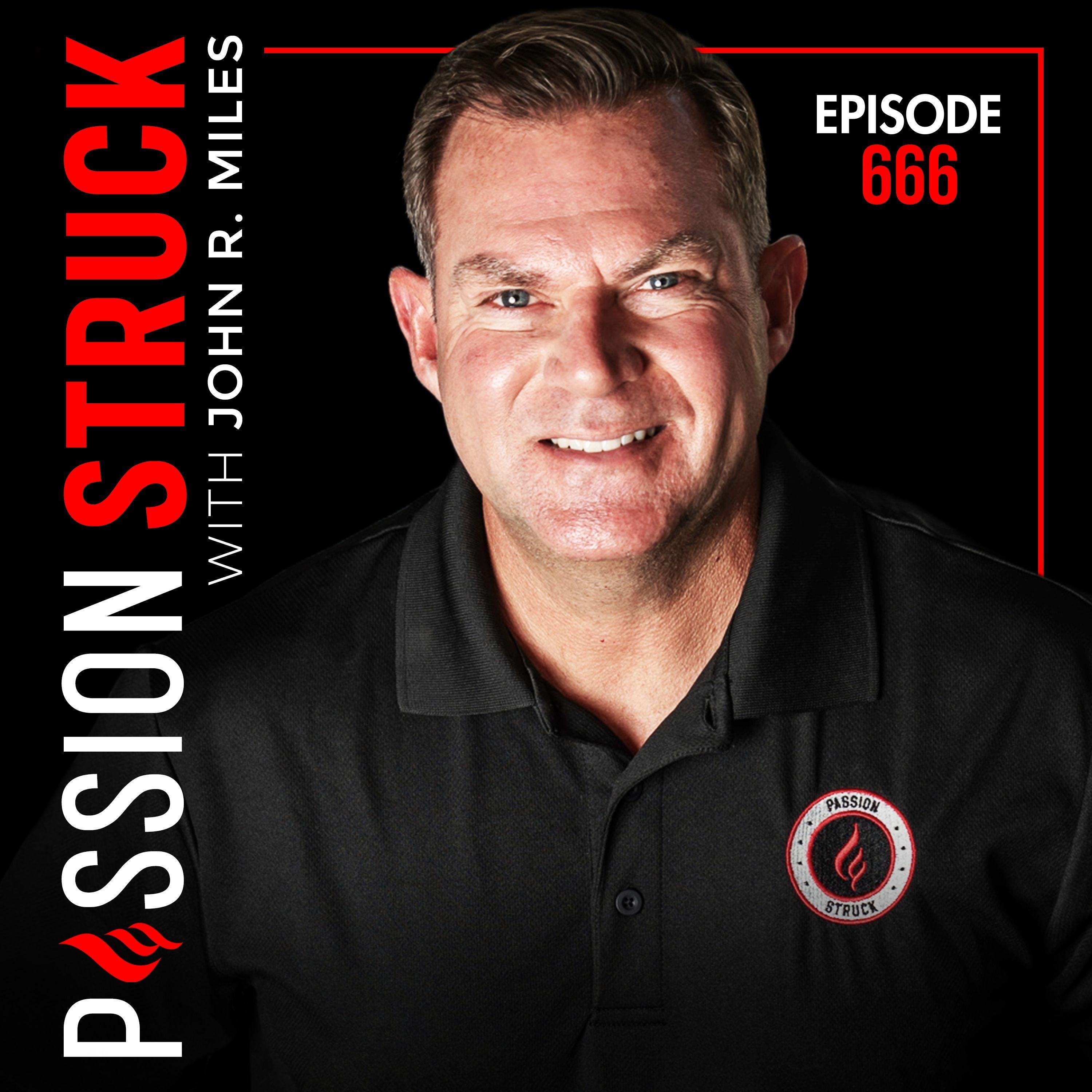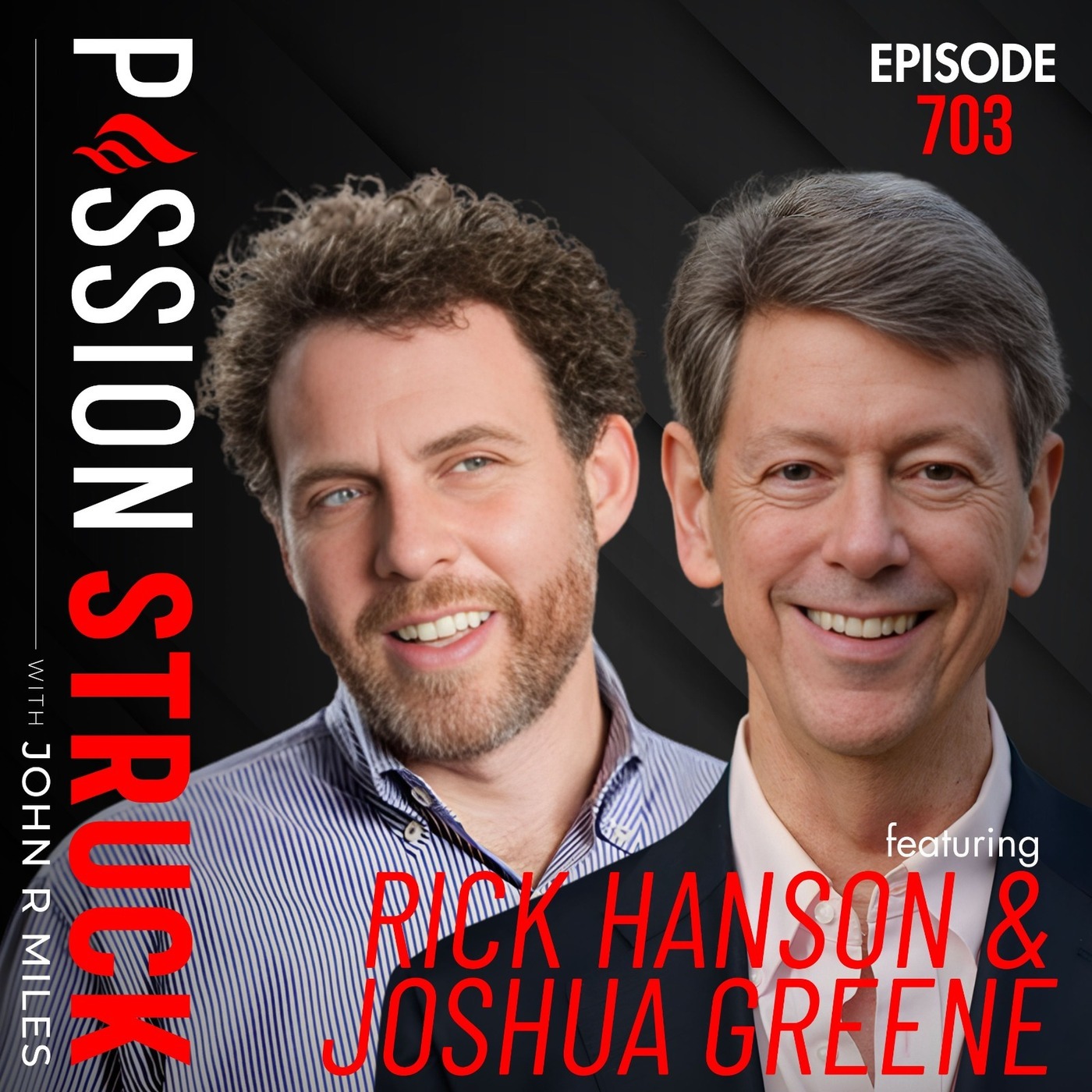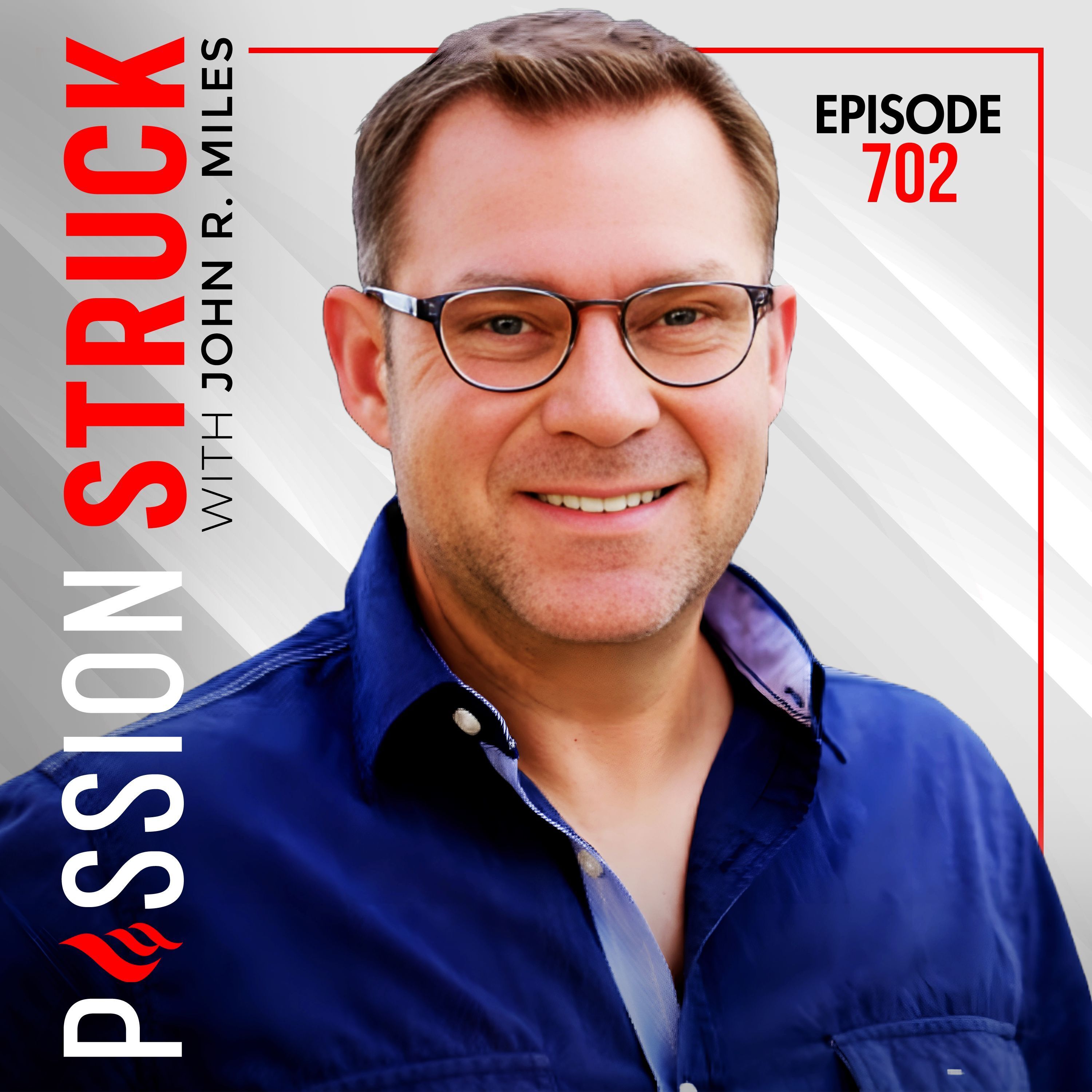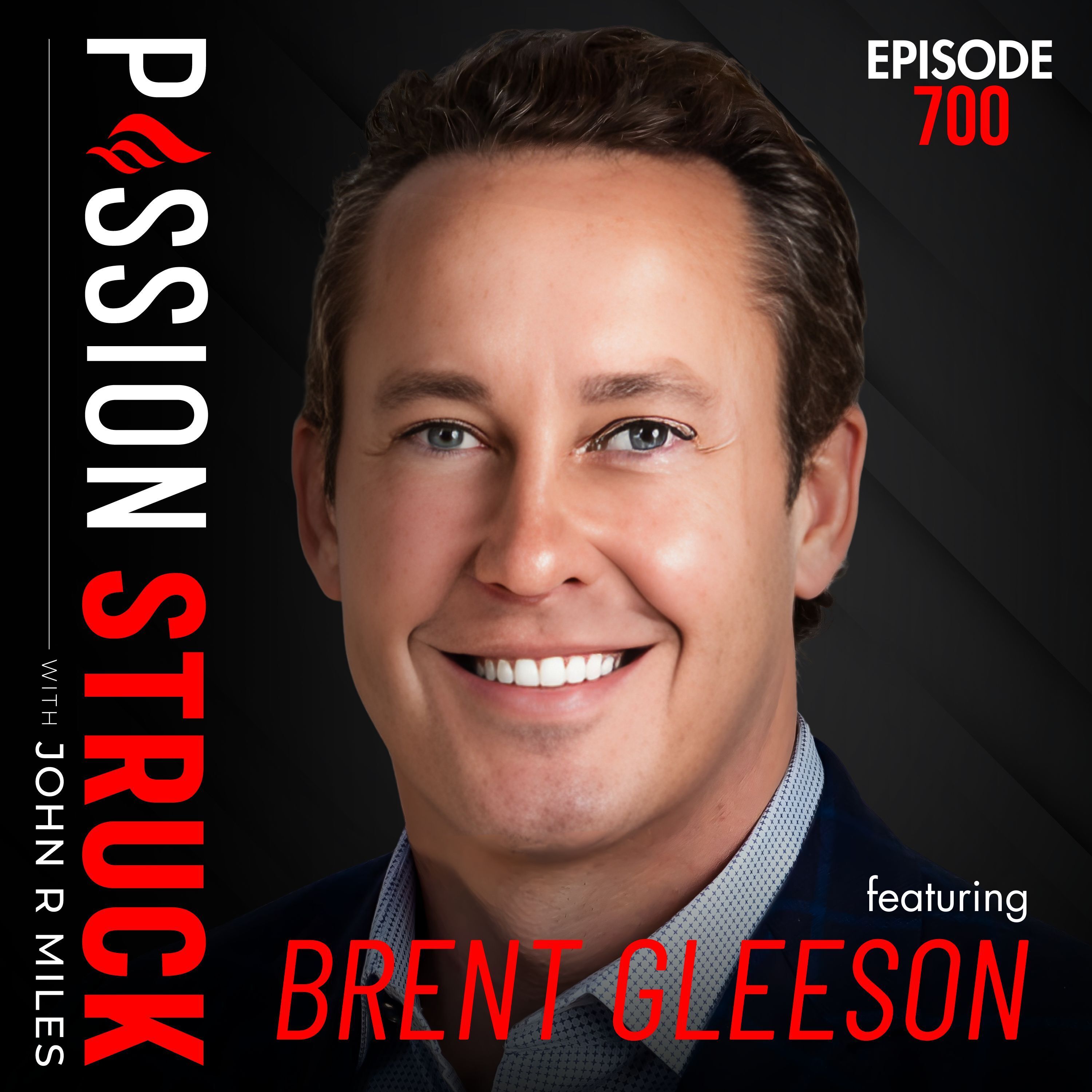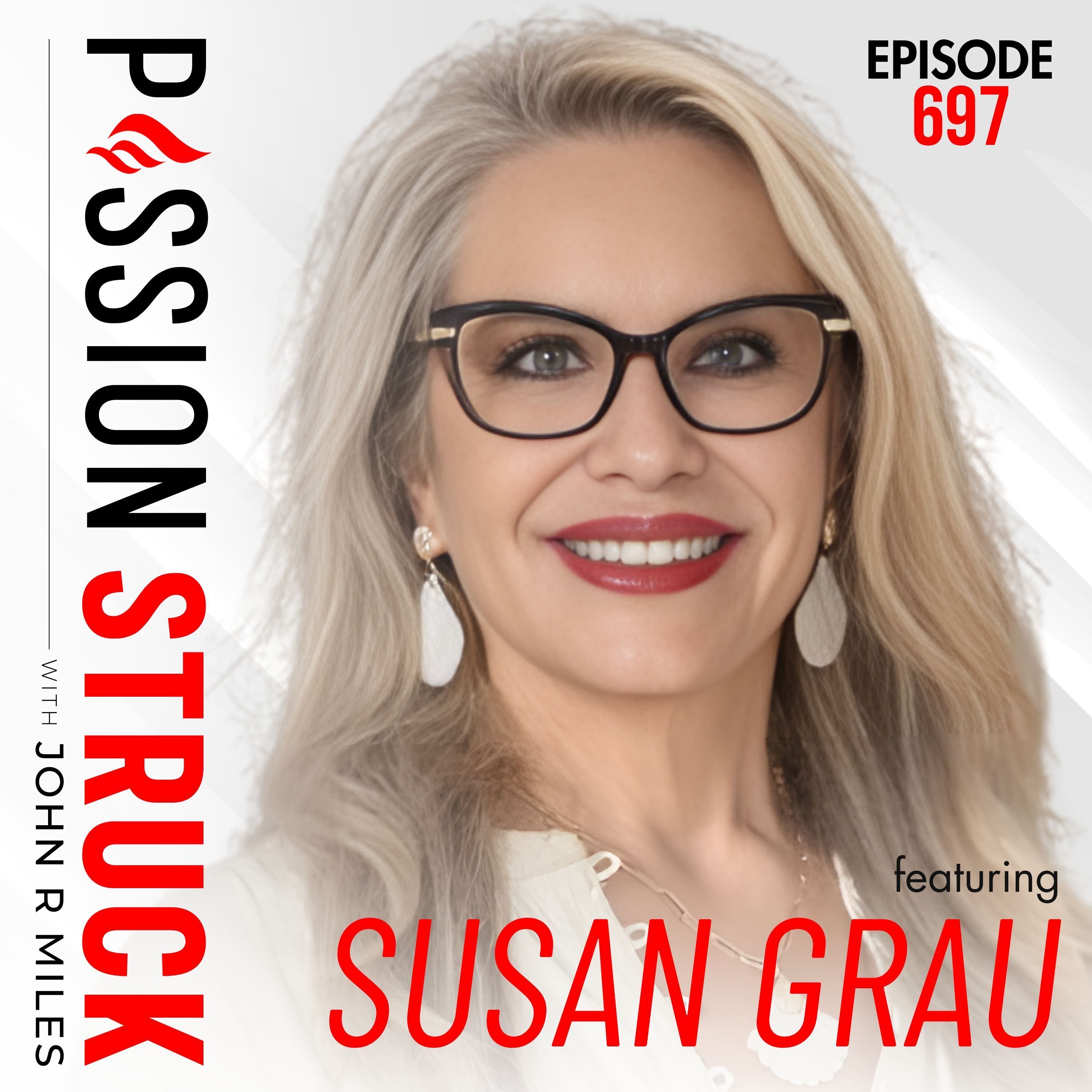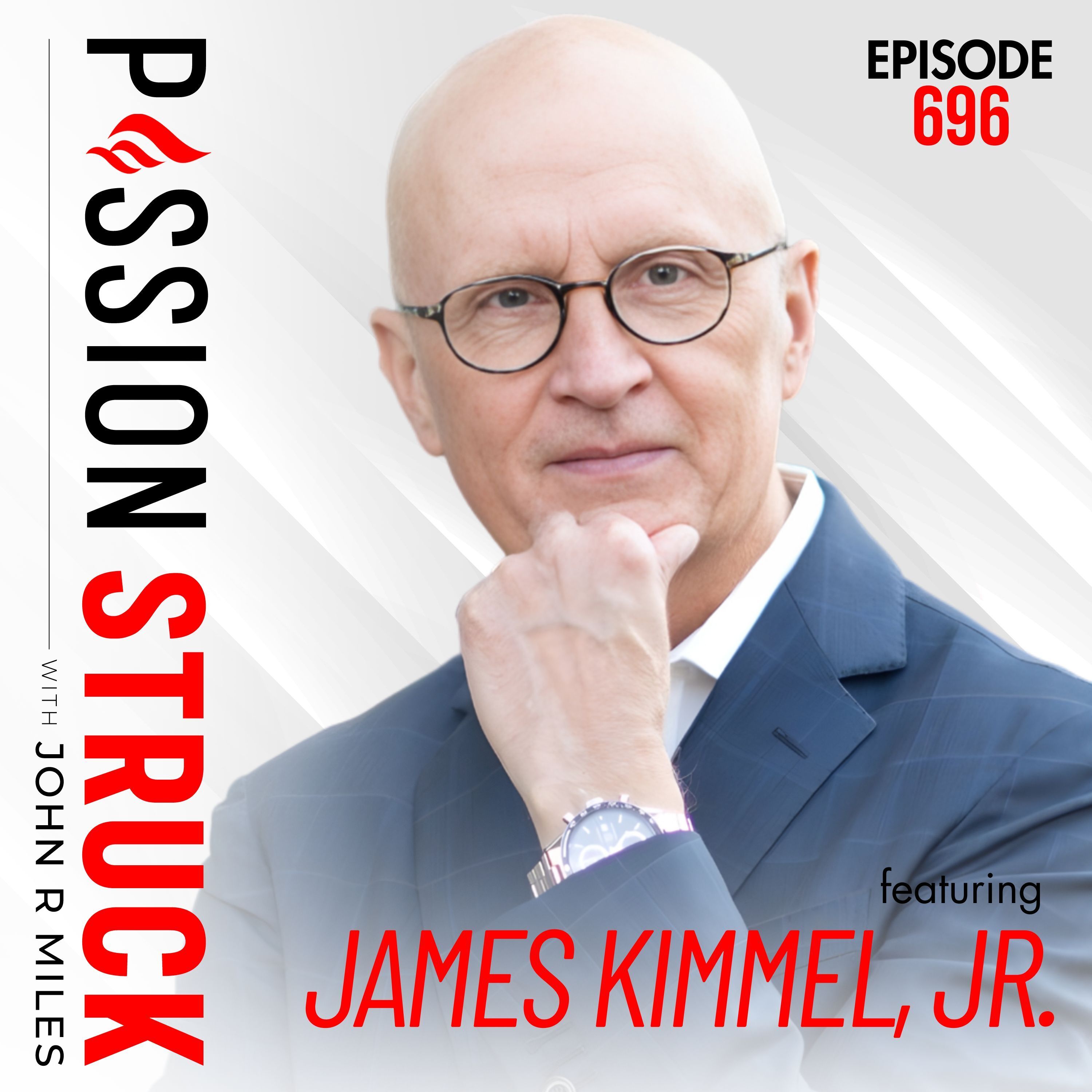How to Build a Personal Legacy (Using the C.H.O.I.C.E. Framework) | EP 666 with John R. Miles
What if legacy isn’t what you leave behind, but what you build every day? In this solo episode, John R. Miles shares how to build a personal legacy using the C.H.O.I.C.E. framework: six daily principles that turn values into action and intention into impact. Discover why your quiet choices matter more than loud success and how to lead a life that lasts.
Visit the Link for the Full Show Notes.
Drawing on personal stories, expert interviews, and real-world insights, John explores the science behind why work is quietly making us sick—and invites listeners to realign with what their body and mind truly need.
Go Deeper: The Ignited Life Substack
If this episode stirred something in you, The Ignited Life is where the transformation continues. Each week, I share behind-the-scenes insights, deeper dives into the episodes, workbooks, science-backed tools, and personal reflections to help you turn intention into action.
Get the full companion workbook at TheIgnitedLife.net
Full episode on YouTube: https://www.youtube.com/@JohnRMiles
Listen on Apple Podcasts, Spotify, or wherever you get your podcasts
Everyone deserves to feel valued and important. Show it by wearing it: https://startmattering.com/
See Privacy Policy at https://art19.com/privacy and California Privacy Notice at https://art19.com/privacy#do-not-sell-my-info.
Press play and read along
Transcript
Speaker 1 Coming up next on Passion Struck, what if legacy isn't something you leave behind, but something you build one quiet decision at a time?
Speaker 1 We tend to think of legacy as a result of success, fame, and fortune. But real legacy? It's forged in the choices no one else sees.
Speaker 1 The ones that demand courage, the ones that reflect our values, even when they're inconvenient, the ones that ask us not who we are when things are easy, but who we are are when everything's on the line.
Speaker 1
Because the truth is, you're already building a legacy. The only question is, are you building it by default or by design? Welcome to Passion Struct.
Hi, I'm your host, John R.
Speaker 1 Miles, and on the show, we decipher the secrets, tips, and guidance of the world's most inspiring people and turn their wisdom into practical advice for you and those around you.
Speaker 1 Our mission is to help you unlock the power of intentionality so that you can become become the best version of yourself.
Speaker 1 If you're new to the show, I offer advice and answer listener questions on Fridays.
Speaker 1 We have long-form interviews the rest of the week with guests ranging from astronauts to authors, CEOs, creators, innovators, scientists, military leaders, visionaries, and athletes.
Speaker 1
Now, let's go out there and become passion struck. Welcome to episode 666 of Passion Struck.
To all of you who come back week after week, thank you so much.
Speaker 1 Your support has helped build not just a podcast, but a mattering revolution. And if this show has helped you live more intentionally or lead more authentically, I'd love your help in two quick ways.
Speaker 1
First, share this episode with someone you care about. A colleague, a student, a mentor.
Word of mouth is how the message spreads.
Speaker 1 Second, if you haven't already, Leave a five-star rating or review on Apple Podcasts for Spotify.
Speaker 1
It takes less than 30 seconds and it's one of the most potent potent ways to help new listeners find the show. This week, a single question has stayed with me.
What defines a legacy?
Speaker 1 Is it the buildings we leave behind, the names etched into stone, or is it something quieter woven into the choices we make when no one is watching?
Speaker 1 On Passionstruck, we've been exploring legacy, not as an endpoint, but as a living process shaped by the values we choose and the actions we take.
Speaker 1 On Tuesday, Cheryl McKessick Daniel shared her remarkable five-generation story, one that began in slavery and now builds the literal infrastructure of America.
Speaker 1 Her legacy isn't just in the skyscrapers, it's in the courage to carry forward a vision others tried to erase.
Speaker 1
Today, we're looking even deeper because legacy doesn't just run through bloodlines or businesses. It runs through behavior.
It lives in the choices we make every day.
Speaker 1 What we honor, what we ignore, what we take responsibility for, and what we pass on.
Speaker 1 To help us understand that, I spoke with Bill von Hippel, an evolutionary psychologist who research reveals something powerful.
Speaker 1
The greatest driver of human success wasn't brute strength or raw intelligence. It was something far more relational.
It was connection, cooperation, the ability to matter to one another.
Speaker 1 So in this solo, I want to bring it all together.
Speaker 1 Not just the family legacies we inherit, not just the social forces we navigate, but the personal choices we make that shape who we become and what we leave behind.
Speaker 1
Every legacy begins with a single decision. Let's talk about how to make a count.
But first, if you want to go deeper with what we explore today, I've created a companion workbook for this episode.
Speaker 1 It's part of our Decoding Humanities series and it's available right now on our sub stack.
Speaker 1 You'll find exercises, journaling prompts, and a full self-check built around the framework I will discuss in today's episode. So you can start applying this in your own life today.
Speaker 1
Just visit theignitedlife.net. Now, let's get into the solo.
Thank you for choosing Passion Struck and choosing me to be your host and guide on your journey to creating an intentional life.
Speaker 1 Now, let that journey begin.
Speaker 1
We tend to think of legacy as something we leave behind. A monument, a name, a record of what we've accomplished.
But what if legacy isn't a monument at all? What if it's a bridge?
Speaker 1
Not something to be admired from a distance, but something to be crossed. Something that connects where we come from to where we're going.
Something we build step by step, choice by choice.
Speaker 1
Some bridges are handed to us. Their foundations were poured long before we were born.
Others we have to build with our own hands, often while walking across them.
Speaker 1
Either way, the choices we make, how we show up, what we honor, what we protect, those are the beams and bolts of the bridge. They're the quiet architecture of legacy.
And leadership?
Speaker 1 Leadership is choosing to build that bridge, even when we don't know who will walk across it. It's carrying the weight, holding the tension, and refusing to let the path collapse.
Speaker 1
That brings me to a story, one that started more than a century ago, one that's still being built today. Cheryl McKissick Daniel didn't just inherit a company.
She inherited a calling.
Speaker 1 Her legacy begins five generations back with a man born into slavery who learned how to build. He passed that skill to his son, who passed it to his son until it reached Cheryl.
Speaker 1 Each generation laid down another plank of the bridge, often under immense pressure, with no guarantee it would hold.
Speaker 1 Today, Cheryl leads McKessick and McKessick, America's oldest black-owned women-led construction company.
Speaker 1 Her firm builds the literal foundations of modern America, bridges, highways, airports, and schools. But the more profound legacy she carries lives beneath the surface.
Speaker 1 It's courage passed forward, vision protected, work done in the shadows is finally brought into the light. When we spoke, Cheryl named something that stuck with me.
Speaker 1
My ancestors were never given the credit they deserve, she said, but they built anyway. That line says everything.
Because how many of us are building something that no one claps for?
Speaker 1 How many of us are choosing to keep going even when the world isn't watching? Cheryl's story is about more than success.
Speaker 1
It's about endurance, about honoring those who came before by choosing to continue and turning pain into purpose, invisibility into impact. She is not just managing a legacy.
She is expanding it.
Speaker 1 She is showing what it means to build forward, not just for yourself, but for others who will walk the path long after you are gone. And that's the truth of legacy.
Speaker 1
Headlines or history books do not define it. Legacy is determined by what we choose to carry and what we choose to create.
That brings us to a deeper question.
Speaker 1 What makes us want to build these bridges in the first place? Why does legacy matter?
Speaker 1 To answer that, we have to go back, not just through our family line, but through our species, before concrete and construction, before blueprints and businesses.
Speaker 1 all the way back to the roots of humanity itself. If Cheryl McKessick Daniels' story shows us the bridge in motion, Bill von Hippel helps us understand why we built it in the first place.
Speaker 1 Bill's not just studying legacy in the context of families or companies. He looks at it across thousands of generations.
Speaker 1 As an evolutionary psychologist, von Hippel asks big questions like what made us human? What helped our ancestors survive? What traits shaped the people we are today?
Speaker 1
And the answer isn't what you might think. It wasn't strength.
It wasn't dominance. It wasn't even intelligence on its own.
Speaker 1 What set our species apart was our ability to cooperate, to contribute, to connect. Our success came not from outperforming each other, but from caring about each other.
Speaker 1
In short, we survived because we mattered to one another. Von Hippel puts it plainly.
For early humans, being excluded from the group, was a death sentence.
Speaker 1
That's why our brains evolved to scan for connection. Belonging wasn't a nice to have.
It was essential. And that need to matter didn't vanish with time.
It lives in us today.
Speaker 1
It shows up in the way we lead, the way we love, and the way we leave our mark. Because when you strip it all down, leadership is not about control.
It's about contribution.
Speaker 1 It's about how we show up for others and the impact we make, even when the reward isn't immediate. Think about that in the context of legacy.
Speaker 1 Your leadership doesn't have to change the world for it to matter. It has to change someone's world.
Speaker 1 And often the most lasting legacies are built not by those who chase recognition, but by those who simply choose to contribute where they are with what they have.
Speaker 1 Von Hippel's work reminds us that the drive to lead, to build, to create meaning, it's not just ambition, it's human nature. Legacy is written into our DNA.
Speaker 1
And yet, for legacy to last, it can't just be a product of instinct. It must become a product of intention.
We must take those primal drives and shape them through values, purpose, and choice.
Speaker 1 That's why in the rest of this solo, I want to introduce a framework to help us think about legacy differently, not just as something we inherit and not just as something we hope for, but as something we build deliberately.
Speaker 1 It starts with six principles that shape who we are and what we leave behind. Now, before we dive into the meat of today's episode, I want to invite you to pause for a moment.
Speaker 1 Grab a pen, open your notes app, because this next part isn't just inspiration, it's instruction. These six principles aren't just for listening, they're for living.
Speaker 1 So if legacy isn't just inherited, but built, then the question becomes, how do we build it? Certainly, not by accident and not by default. but by choice.
Speaker 1
And in the word choice, each letter stands for a principle, a decision point that shapes how we lead, live, and leave our mark. Let's break it down.
C in choice is for courage.
Speaker 1
Every legacy begins with a courageous choice. Not the kind of bravery that makes headlines, but the kind that happens quietly.
The courage to speak truth in rooms where it's inconvenient.
Speaker 1 The courage to stand for something when it would be easier to blend in. the courage to begin again and again and again after failure or rejection.
Speaker 1
Cheryl McKissick Daniel didn't build her company's future by playing it safe. She stepped into a legacy that was on the brink and chose to lead with conviction.
That's courage.
Speaker 1 Not waiting for the perfect moment, but creating the next moment through action. The truth is, legacy always asks for courage because doing something meaningful means risking something valuable.
Speaker 1
And those who build bridges know the span between vision and impact is paved with bold steps. And this leads us to the next letter in the choice framework.
H is for honor.
Speaker 1 Honor is choosing to live by your values, especially when it costs you something. It's how you carry your name, your role, and your influence.
Speaker 1 Cheryl's story is full of honor, not just honoring her ancestors, but honoring the responsibility she carries in the present. She doesn't just lead her company.
Speaker 1 She carries a lineage, and she treats that with care. Von Hippel also reminds us that our brains evolved evolved to track fairness, to respect reciprocity, to value loyalty.
Speaker 1 These are ancient instincts, but when we bring intention to them, they become honor, a conscious commitment to character over convenience.
Speaker 1 And when you lead with honor, you don't have to talk about legacy because you embody it. Before we move into the next letter, I want to take a moment to share something meaningful.
Speaker 1 If this episode is challenging you to lead more intentionally and to lead with deeper purpose, I created something to help you carry that message into the world, literally.
Speaker 1 It's called Start Mattering, our exclusive line of apparel, designed to remind you and the people around you that you matter, that your choices matter, that how you live today shapes the legacy you leave tomorrow.
Speaker 1
These aren't just shirts or hoodies or hats. They're wearable declarations.
because sometimes the most powerful message isn't spoken, it's worn.
Speaker 1 You can check out the full collection at startmattering.com and grab something that reminds you to lead from values, not noise. Now, a quick break from our sponsors.
Speaker 1 Thank you for supporting those who support the show. You're listening to Passion Struck on the Passion Struck Network.
Speaker 1
Welcome back. So far, we've talked about courage, the bold steps that set legacy in motion.
We talked about honor, the quiet integrity that gives it strength.
Speaker 1
Now let's turn to the third piece of the choice framework. O is for ownership.
Ownership means taking responsibility, not just for the outcomes you want, but for the influence you carry along the way.
Speaker 1
Ownership means refusing to coast or blame. It's choosing to say, this is mine to lead.
This is mine to shape. That might mean owning your mistakes.
It might mean owning your potential.
Speaker 1 But either way, it's about stepping out of the passenger seat and into the driver's seat of your own impact. Von Hibbel's research shows that early humans didn't thrive through hierarchy alone.
Speaker 1
They thrived in tribes where people showed up, contributed, and carried their weight. Leadership, in other words, wasn't just positional.
It was participatory.
Speaker 1
Legacy leaders don't wait for permission to lead. They own the work, the culture, and the ripple effects of their choices.
And this leads us to the next letter in the choice framework.
Speaker 1
I is for integrity. Integrity is doing what's right, not because someone's watching, but because you are.
It's not about perfection. It's about alignment.
Speaker 1
When your actions line up with your values, even when it costs you something, that's integrity. And legacy at its core is made up of those moments.
Think back to McCassick Daniel.
Speaker 1
She could have diluted her values to make things easier in the male-dominated world of construction, but she didn't. She held the line.
She led with principle.
Speaker 1
That's not easy, but it's what separates legacy builders from ladder ladder climbers. Integrity isn't loud.
It's not flashy. It's a series of quiet decisions that form a through line in your life.
Speaker 1 And over time, that line becomes the most trustworthy part of your leadership. So ask yourself, where am I compromising in small ways that chip away at my core?
Speaker 1
And what would it look like to return to alignment, not someday, but now? And that leads us to the next letter in choice. C is for contribution.
Legacy isn't built on accumulation.
Speaker 1 It's built on what you give. Contribution means using your time, voice, or presence to build something that outlasts you.
Speaker 1 Not everyone needs to change the world, but we all have the opportunity to impact someone else's world. Von Hippel's work shows that human success came not from dominance, but from generosity.
Speaker 1
Our ancestors shared knowledge, tools, and protection with one another. Contribution wasn't charity.
It was survival. Today, it's still true.
Speaker 1
The leaders who make the most profound impact aren't the ones who hoard resources. They're the ones who multiply them.
And McKessick Daniel is a living example.
Speaker 1
She's not just running a successful firm. She's mentoring, building pipelines, lifting others.
That's a contribution in motion. So ask yourself, What are you building that someone else can stand on?
Speaker 1 Where are you investing? Not just in outcomes, but in people? Because the real legacy isn't what you leave, it's what you plant. And that leads us to the final letter in the choice framework.
Speaker 1
E is for endurance. Anyone can make a bold decision once.
Endurance is consistency when the applause fades. It's showing up again and again, through setbacks, through pressure.
Speaker 1 through the long, often unseen stretch between planting and harvest. It's the belief that the small repeated choices are what hold the whole structure together.
Speaker 1 Cheryl's family didn't just build buildings, they built across generations. Her great-great-grandfather started with no formal education and worked through slavery.
Speaker 1 Her grandfather ran the business through the Great Depression. Her mother stepped in when her father died suddenly.
Speaker 1
And Cheryl, she fought through systematic resistance to claim her place and expand the vision. That's endurance.
And von Hippel's research shows that science backs this up.
Speaker 1
Survival wasn't about shortbursts of dominance. It was about sustained cooperation and resilience.
The communities that lasted were the ones that stayed committed.
Speaker 1
Endurance is what turns contribution into legacy. It's what keeps courage, honor, and integrity from fading with time.
Because real leadership isn't defined by the easy seasons.
Speaker 1
It's shaped by how you move through the storms. That's the power of endurance.
It isn't glamorous. It isn't always recognized, but it's what turns daily decisions into lasting impact.
Speaker 1 So now the question becomes, how do we live this? How do we move from inspiration to implementation? Let's bring choice out of theory and into practice.
Speaker 1
Here's a real world scenario and how each part of choice can guide your response. So I want to give you a scenario.
You're leading a team at work. and facing resistance to a major new initiative.
Speaker 1
I've been there. Morale is shaky.
You're questioning whether to push forward or back off. So let's apply the choice framework to the situation.
It starts with courage.
Speaker 1 You call a meeting not to defend the plan, but to open space for honest feedback. You listen, even when it's uncomfortable.
Speaker 1
You say what needs to be said without hiding behind the slides or the strategy. Honor.
You reflect on the original intent behind the initiative.
Speaker 1 Is it aligned with your deeper mission or just a response to pressure? You realign the plan with the values that matter to the organization and to you. Ownership.
Speaker 1
You take responsibility for what's not working. Instead of blaming your team for resistance, you ask yourself where communication or clarity fell short.
Then you fix it. Integrity.
Speaker 1
You resist the urge to make short-term compromises for the sake of appearances. You stick with the decision that's best for the team long-term.
even if it's not the most popular one right now.
Speaker 1
Contribution. You identify someone on your team who needs support to grow into their role.
You mentor them. You invite their ideas.
You create space for them to lead to.
Speaker 1 And then in turns, you stay the course, not because it's easy, but because you know legacy isn't built in a single moment. It's built in the choices you make when no one's applauding yet.
Speaker 1
This is how choice comes alive, not as a concept, but as a compass. And if you're not in a leadership role, this still applies.
Here's a simplified version for your your personal life. Courage.
Speaker 1
Have the conversation you've been avoiding. Honor.
Align your calendar with what you value. Ownership.
Take responsibility for one frustration this week. Integrity.
Speaker 1
Make a small decision that realigns you with your values. Contribution.
Pour into someone else. Help them rise.
And endurance. Stick with one habit or commitment for seven more days.
Speaker 1 These aren't just habits. They're handholds for building a life and legacy that that lasts.
Speaker 1 When you start living choice, not just thinking about it, but practicing it, you begin to notice something deeper. These aren't just leadership principles, they're deeply human needs.
Speaker 1
Because behind every act or contribution, there's something ancient driving us. The need to belong, to connect, to matter.
And that brings us to a powerful truth uncovered in von Hippel's research.
Speaker 1 To truly understand the psychology of legacy, we have to explore the tension between autonomy and connection and why getting it wrong is quietly unraveling so many lives today.
Speaker 1 Humans crave autonomy, but also deeply need connection. And when autonomy is overemphasized, as it often is in modern life, we begin to erode our sense of mattering.
Speaker 1
We tell ourselves that leadership means independence, that success is about self-sufficiency. but isolation doesn't build legacy.
Relationships do.
Speaker 1 Too much autonomy without connection creates what Gordon Flett calls anti-mattering. It's the hidden crisis behind so many sad success stories.
Speaker 1 People who have it all but feel unknown, unsupported, and ultimately unfulfilled. Psychologists have long studied regret, and over and over, people don't regret the risk they took.
Speaker 1
They regret the connections they didn't nurture, the authenticity that didn't live. the legacy they didn't create.
As palliative nurse Bronnie Ware,
Speaker 1 a former guest on the the show, documented, the number one regret of the dying is this. I wish I had had the courage to live a life true to myself, not the life others expected of me.
Speaker 1
Legacy doesn't require autonomy. It requires alignment with people, with purpose, with what matters most.
So let me bring this back to you.
Speaker 1 What legacy are you building through the quiet choices no one sees? Which pillar of choice is most alive for you right now? And which one is quietly asking for your attention?
Speaker 1 Maybe it's courage to finally take the step you've been postponing. Maybe it's honor to let your calendar reflect your values, not just your obligations.
Speaker 1 Maybe it's contribution to shift from success towards significance by building something for others. Whatever it is, take a moment today and name it, not someday.
Speaker 1
Not when the timing is perfect, but now in the small, repeated choices that shape who you're becoming. And let me leave you with this.
What plank of the bridge are you laying today?
Speaker 1 Because every decision you make, in courage, in ownership, in integrity, becomes part of the structure someone else may one day walk across.
Speaker 1 That's how we build legacy, not by waiting to be remembered, but by choosing to build something. worth remembering.
Speaker 1 And that's a wrap. If this episode resonated with you, you, I'd love to invite you into the greater Passion Star community.
Speaker 1 You'll find the full episode transcript plus bonus content at theignitedlife.net. And while you're there, grab the companion workbook to help you reflect on your own legacy and leadership.
Speaker 1 If you're looking to bring this message to your organization, I'm now booking select keynote speaking engagements.
Speaker 1 Whether it's a leadership summit, corporate retreat, or campus event, you can learn more at johnrmiles.com slash speaking.
Speaker 1 For deeper dives behind the scenes interviews and new new exclusive content, head to our YouTube channel and subscribe.
Speaker 1 We publish full episodes and conversations and insights that go beyond what you hear on the podcast.
Speaker 1 And if you're ready to carry this message into the world, explore our Start Mattering collection, apparel designed to remind you and those around you that your choices matter because leadership isn't just lived, it's warned.
Speaker 1 Visit Start Mattering to see the full line. Coming up next in our series on decoding humanity, we shift into week four, identity, belonging, and why community heals.
Speaker 1 Journalist Olga Kazan joined me to explore how we form identity in a fractured world and why belonging is medicine for the soul.
Speaker 2 You can try very hard. You can do everything in your power to try to get a certain outcome, but you can't ultimately control the outcome.
Speaker 2 Like you have to let go at a certain point and let the cards fall where they may.
Speaker 2 And to me, that was really freeing because I had lived my whole life thinking that if I didn't control the outcome and I didn't have the outcome that I wanted, that it was my personal fault and I should have done things differently.
Speaker 2 But I could just, I don't know, it's like nice to know that like other people also have this struggle and have realized that at a certain point, yeah, you can try.
Speaker 2
You can work on a political campaign super duper hard. And then come election day, they might pick the other guy.
And that's just part of life.
Speaker 1 And finally, stay tuned. I've been quietly working on something close to my heart and it's almost ready to share.
Speaker 1 Until then, live with clarity, lead with intention, choose boldly, and never forget, you're not just living a story, you're building a bridge others may one day walk across.
Speaker 1 That's becoming passion-struck.
